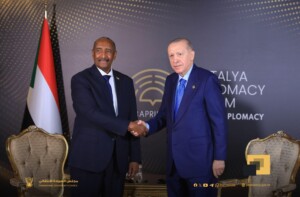Activists: ‘Anti-drug clampdown could lead to further civil persecution in Sudan’

Lt Gen Abdelfattah El Burhan (left) meets with the leaders of the security and military agencies and the governor of Khartoum on Tuesday (Photo: SUNA)
Sudanese anti-drug activists and civil society organisations denounced comments made by the Chairman of the Sovereignty Council, Lt Gen Abdelfattah El Burhan, where he accused “certain parties of distributing narcotics to young people, under the guise of spreading democracy”.
In an interview with Radio Dabanga’s Sudan Today programme, Tahani Abbas, a member of the No to Oppression Against Women Initiative, declared yesterday that El Burhan’s statements during his Tuesday meeting with various junta officials, “were an attempt to demonise civil society”.
Abbas went on to add that the military junta could use the rising drug epidemic as a pretext to justify “a clampdown on resistance committees”. The women’s initiative member affirmed the need for “qualified police that respect the rule of law”, explaining that cover-ups by the Sudanese police, “facilitated the import and selling of narcotics”.
Pointing to Egypt and South Africa, Abbas stated that Sudan should benefit from their experience in handling the recent rise in drug use, “unlike El Burhan’s current management of the situation without a clear plan”, she said.
Mustafa Adam, Director of the Sudanese NGO El Zargaa, also expressed his fears that the junta leader’s accusations could mean “more control and oppression of civil society organisations”.
He told Radio Dabanga, that the statements made earlier this week by the Sovereignty Council leader needed additional contextualisation before such comments could be levied at civil society organisations. According to the NGO director, El Burhan should “identify the accused organisations, freeze their work, and hold them accountable”.
The Governor of Khartoum, Ahmed Osman Hamza, said in a press statement following the meeting with El Burhan, that they discussed “the causes and factors of the rapidly increased drug outbreak” in the country. Also stating that an “intensive campaign will be organised to reduce the supply of local and imported drugs”.
Corruption
Due to the weak border controls and tense internal conditions in Sudan, the drugs trade has found an easy way to enter the country, social researcher Mohamed Adlan said.
Bordering seven countries, with often porous borders, Sudan has become an easy target for the smuggling of drugs, by air, over land, and, more and more, by sea.
Sudan’s 2021 report to the UN on the spread of drugs in the country for instance mentioned that the smuggling of heroin, which used to be confined to Sudanese airports, has shifted to Red Sea ports. Ships are being used more and more to smuggle large quantities of heroin into the country, the report said.
Other drugs were smuggled into Sudan over sea much earlier, whereby allegedly also officials were involved. A former member of the Sudanese Coast Guard in Port Sudan, capital of Red Sea state, told Radio Dabanga that his forces found four containers filled with pills and powder in 2013. “Apparently, it belonged to the son of an official, so we were asked to move the containers to Khartoum and hand over the investigation to the authorities there. We never heard something about the subject again.”
The officer, who worked at for the anti-drug unit in Abu Jubeiha in South Kordofan until 2011, added that it was not unusual to discover that government officials in Abu Jubeiha were responsible for the trade. “Many of the smugglers we caught would later be released following orders from the top.”
The former police officer confirmed that policemen, army officers, members of the Rapid Support Forces and former rebel fighters are among the drug traders. “They all trade and use themselves as well”, he claimed. “Every day, police all over Khartoum receive reports from the anti-drug units. They then seize the traders and their goods, but the confiscated drugs are often sold on again.”
Rebel groups are also involved in the trade of drugs. El Intibaha newspaper reported in July that a load of 1,000 Tramadol tablets of 225 milligrams was seized by customs officers at Khartoum International Airport in November last year. The bill of lading contained the name of the person to whom the goods were sent but the customs officers reported “an unknown person”.
According to El Intibaha, the load was manufactured in Mumbai, India. It was shipped to Israel, from where it was sent to South Sudan. The pills were then transported by Ethiopian Airlines to Khartoum.
The newspaper reported that months later, leaders of a rebel group submitted a letter to the customs department, demanding the deliverance of the load, as Tramadol is used by their members for “training purposes”. They were referred to court.











 and then
and then